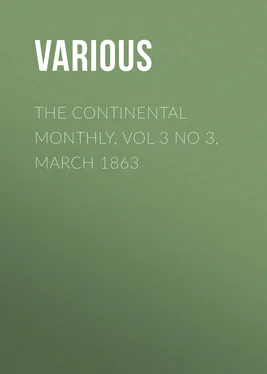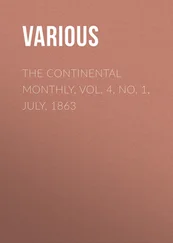Various - The Continental Monthly, Vol 3 No 3, March 1863
Здесь есть возможность читать онлайн «Various - The Continental Monthly, Vol 3 No 3, March 1863» — ознакомительный отрывок электронной книги совершенно бесплатно, а после прочтения отрывка купить полную версию. В некоторых случаях можно слушать аудио, скачать через торрент в формате fb2 и присутствует краткое содержание. Жанр: foreign_antique, periodic, Языкознание, Политика, foreign_edu, на английском языке. Описание произведения, (предисловие) а так же отзывы посетителей доступны на портале библиотеки ЛибКат.
- Название:The Continental Monthly, Vol 3 No 3, March 1863
- Автор:
- Жанр:
- Год:неизвестен
- ISBN:нет данных
- Рейтинг книги:5 / 5. Голосов: 1
-
Избранное:Добавить в избранное
- Отзывы:
-
Ваша оценка:
- 100
- 1
- 2
- 3
- 4
- 5
The Continental Monthly, Vol 3 No 3, March 1863: краткое содержание, описание и аннотация
Предлагаем к чтению аннотацию, описание, краткое содержание или предисловие (зависит от того, что написал сам автор книги «The Continental Monthly, Vol 3 No 3, March 1863»). Если вы не нашли необходимую информацию о книге — напишите в комментариях, мы постараемся отыскать её.
The Continental Monthly, Vol 3 No 3, March 1863 — читать онлайн ознакомительный отрывок
Ниже представлен текст книги, разбитый по страницам. Система сохранения места последней прочитанной страницы, позволяет с удобством читать онлайн бесплатно книгу «The Continental Monthly, Vol 3 No 3, March 1863», без необходимости каждый раз заново искать на чём Вы остановились. Поставьте закладку, и сможете в любой момент перейти на страницу, на которой закончили чтение.
Интервал:
Закладка:
After his death,
I searched his papers, vainly, for a scrap
Whereon some dropped memento might record
His inner nature; but he nothing left—
Nothing of that deep life whose wondrous light
Guided him onward through the realms of sense,
And in a world of practical self-need
Sustained him with a glory unexpressed.
And thus it is that round the Poet's urn,
The sod is beaten down with pensive feet:
And thus it is that where the Merchant lies,
The grass, untrodden, groweth rank and green.
THE BLUE HANDKERCHIEF
I had passed my last examinations, and had received my diploma authorizing me to practise medicine, and I still lingered in the vicinity of Edinburgh, partly because my money was nearly exhausted, and partly from the very natural aversion I felt from quitting a place where three very happy and useful years had been spent. After waiting many weeks—for the communication between the opposite shores of the Atlantic were not then so rapid as now—I received a large packet of letters from 'home,' all of them filled with congratulations on my success, and among them were letters from my dear father and a beloved uncle, at whose instance (he was himself a physician) my father had sent me abroad to complete my medical education. My father's letter was even more affectionate than usual, for he was highly gratified with my success, and he counselled me to take advantage of the peace secured by the battle of Waterloo to visit the continent, which for many years (with the exception of a brief period) had been closed to all persons from Great Britain; he enclosed me a draft on a London banker for a thousand pounds. My uncle's letter was scarcely less affectionate; my Latin thesis (I had sent my father and him a copy) had especially pleased him; and after urging me to take advantage of my father's kindness, he added that he had placed a thousand pounds at my disposition, with the same London banker on whom my draft was drawn. A letter of introduction to a French family was enclosed in the letter, and he engaged me to visit them, for they had been his guests for a long time when the first Revolution caused them to fly France, and they were under other obligations to him; which I afterward learned from themselves was a pecuniary favor more than once renewed during their residence with him. Ten thousand dollars was a good deal of money to be placed at the disposition of a young man as his pocket money for eighteen months, even after a large deduction had been made from it for a library and professional instruments.
Before I quitted Edinburgh, I received a letter from the gentleman to whom my uncle had given me an introduction; he acquainted me that my uncle had informed him that I was about visiting France, and that he had taken the liberty of introducing me to him. The Marquis de – (such was his title—his name I omit for obvious reasons) expressed with great warmth his delight at having it in his power to exhibit the gratitude he felt to my uncle, and urged me with the most pressing terms to come at once to his home, and pass away there at least so much time as might accustom me to the spoken French language (I could easily read it), that my visit to Paris might be more profitable and agreeable—and it should be both, he was so good as to say, at least as far as it depended on himself and his friends. I wrote him by the return mail to thank him for his kindness, and to inform him that I should at once set out for his hospitable home. I shall never forget the six months I passed away in the Chateau de Bardy: the happiness of those days was checkered only by my departure and by the incident I shall presently relate. And even after I quitted that noble mansion, the kindness of its inmates still watched over me, and opened homes to me even in that great Maelstrom of life—Paris.
It was toward the end of the month of October—the most delightful month of the seasons in France—as I was returning on foot from Orleans to the Chateau de Bardy, from a rather prolonged pedestrian exploration in that interesting neighborhood, where I had accurately examined all of the curiosities, thanks to an ample memoir of my noble host (in those days 'Handbooks' were unknown, and Murray was busy publishing Byron and Moore), when I thought I caught a glimpse of some soldiers. I was not mistaken: on the road before me a Prussian regiment was marching. I quickened my pace to hear the military music, for I was extremely partial to it; but the band ceased playing, and no sound was heard except an occasional roll of the kettle-drum at long intervals to mark the uniform step of the soldiers. After following them for a half hour, I saw the regiment enter a small plain, surrounded by a fir grove. I asked a captain, whose acquaintance I had made, if his men were about to be drilled.
'No,' said he, 'they are about to try, and perhaps to shoot, a soldier of my company for having stolen something from the house where he was billeted.'
'What,' said I, 'are they going to try, condemn, and execute him, all in the same moment?'
'Yes,' said he, 'those are the provisions of the capitulation.'
This word 'capitulation' was to him an unanswerable argument, as if everything had been provided for in the capitulation, the crime and the punishment, justice and humanity.
'And if you have any curiosity to see it,' added the captain, 'I will place you where you may see everything. It won't be long.'
It may be from my professional education, but the truth is, I have always been fond of witnessing these melancholy spectacles; I persuade myself that I shall discover the solution of the enigma—death—on the face of a man in full health, whose life is suddenly severed. I followed the captain. The regiment was formed in a hollow square; in the rear of the second rank and near the edge of the grove, some soldiers were digging a grave. They were commanded by the third lieutenant, for in the regiment everything was done with order, and there is a certain form observed even in the digging of a man's grave. In the centre of the hollow square eight officers were seated on drums; a ninth officer was on their right, and some distance before them, negligently writing something, and using his knees as his desk; he was evidently filling up the forms simply because it was against the 'regulations' that a man should be killed without the usual forms. The accused was called up. He was a tall, fine-looking young man, with a noble and gentle face. A woman (the only witness in the cause) came up with him. But when the colonel began the examination of the woman, the soldier stopped him, saying:
'It is useless asking her any questions. I am going to confess everything: I stole a handkerchief in that lady's house.
The Colonel. What! Piter! You have been stealing! We all thought you incapable of such a thing!
Piter. It is true, Colonel, I have always tried to pass as an honest man, and a good fellow. Oh! I tell you, it wan't for me I stole the handkerchief. 'Twas for Mary.
The Colonel. Who is Mary?
Piter. Mary? Oh! she lives yonder.... at home.... just outside of Areneberg.... don't you remember the big apple-tree?.... Oh! I shall never see her again....
The Colonel. I don't understand you, Piter; explain yourself.
Piter. Why, Colonel.... but read this letter.
He gave the colonel a letter, which the latter read aloud, and every word of which was engraved on my mind, and still is as present to my memory as though I heard them an hour ago. It was as follows:
My dear, dear Piter:—I take advantage of recruit Arnold's leaving, for he has enlisted in your regiment, to send you this letter, and a silk purse I have made for you. Oh! I have hidden from father to work it, for he is always scolding me for loving you so much, and is always telling me that you will never come back. But you will come back, won't you! Even if you never come back, I will always love you just the same. I promised myself to you the day you picked up my blue handkerchief at the Areneberg dance, and brought it to me. Oh! when shall I see you again? The only pleasure I have is to hear that your officers esteem you, and your comrades love you. Everybody says you are an honest man and a good fellow. But you have still two years to serve. Serve them quickly, because then we shall be married. Good-by, dear, dear Piter, and believe me, your own dear
Читать дальшеИнтервал:
Закладка:
Похожие книги на «The Continental Monthly, Vol 3 No 3, March 1863»
Представляем Вашему вниманию похожие книги на «The Continental Monthly, Vol 3 No 3, March 1863» списком для выбора. Мы отобрали схожую по названию и смыслу литературу в надежде предоставить читателям больше вариантов отыскать новые, интересные, ещё непрочитанные произведения.
Обсуждение, отзывы о книге «The Continental Monthly, Vol 3 No 3, March 1863» и просто собственные мнения читателей. Оставьте ваши комментарии, напишите, что Вы думаете о произведении, его смысле или главных героях. Укажите что конкретно понравилось, а что нет, и почему Вы так считаете.












